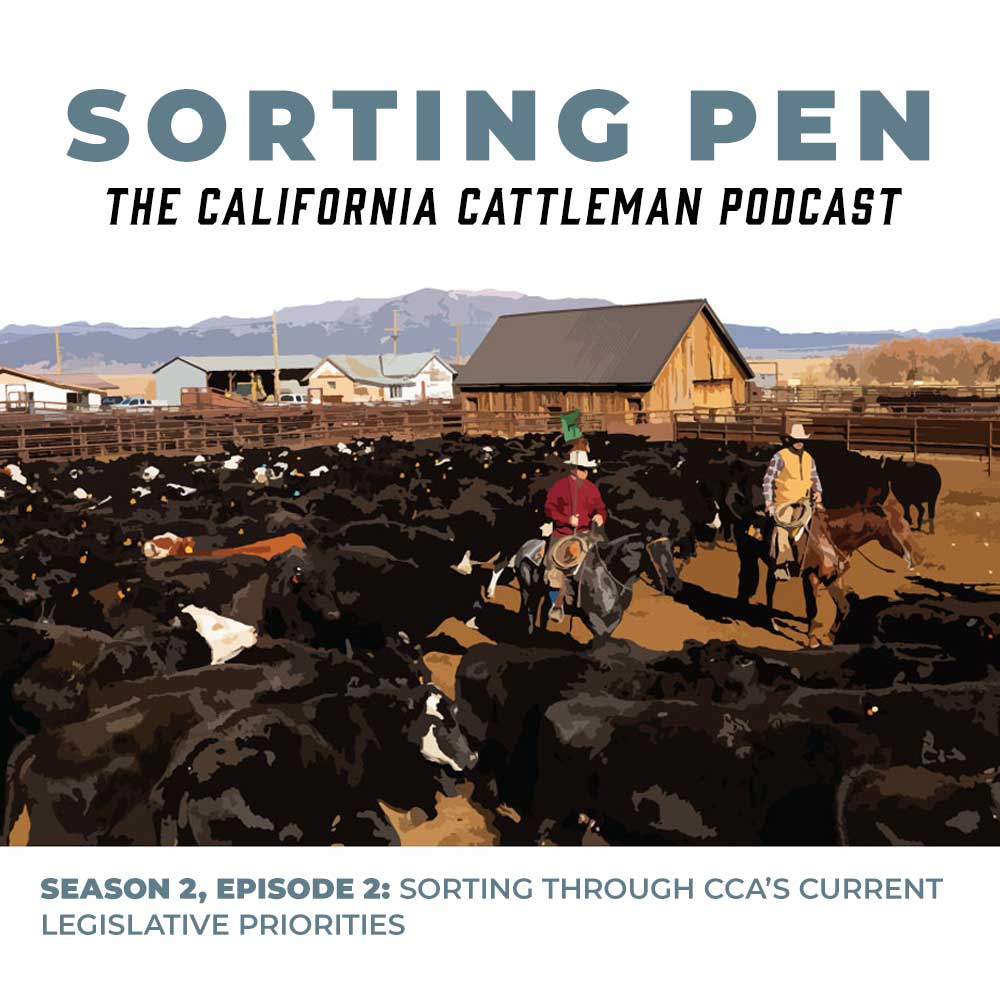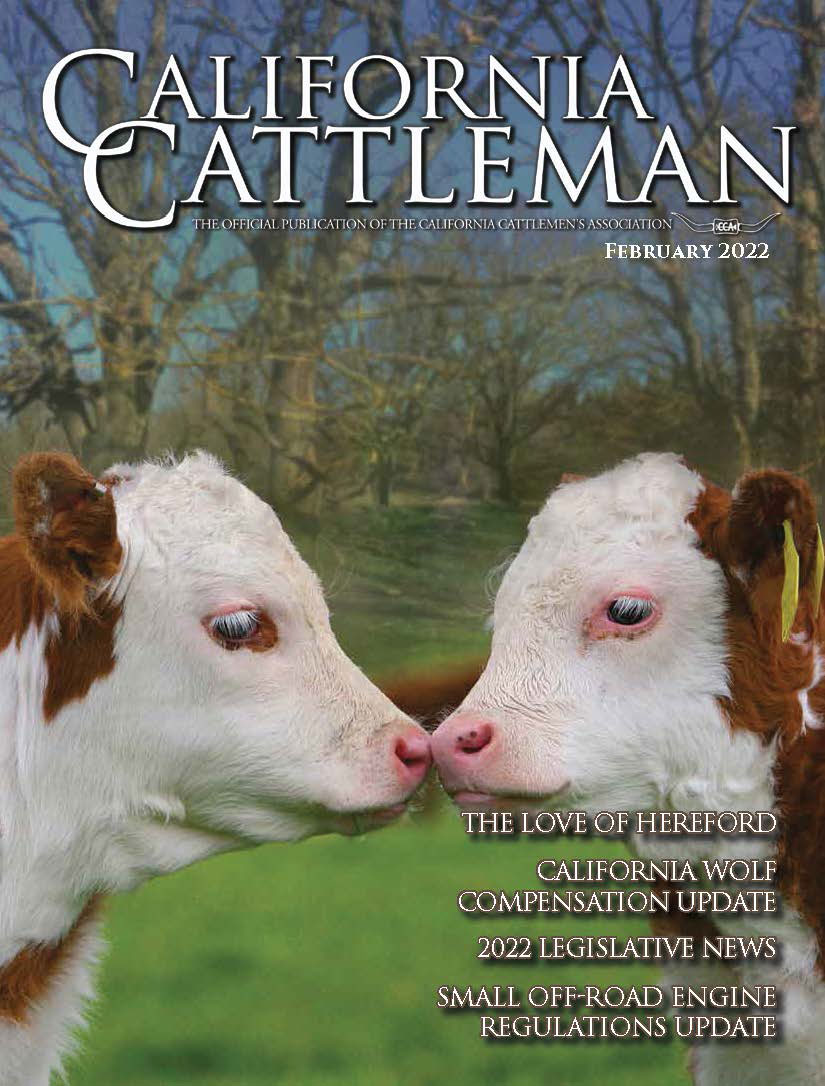
LEGISLATIVE BULLETIN
January 31, 2022
To read the full version each week, please subscribe below.
CCA-Sponsored Legislation Introduced to Preserve Cost-Saving Training Program
On Tuesday, Senator John Laird (D-Santa Cruz) introduced CCA-sponsored Senate Bill 880. If signed into law, SB 880 would indefinitely extend the availability of University of California Cooperative Extension (UCCE) water diversion monitoring and reporting courses which certify ranchers and other water rightsholders as “qualified individuals” for purposes of installing and maintaining water measurement devices required by state law.
In 2015, SB 88 required all water rightsholders with diversions greater than 10 acre-feet per year to install measurement devices at their points of diversion (among other requirements). Implementing regulations required those devices to be installed by “qualified individuals,” who for diversions of 100 acre-feet or more per year were defined as professional engineers or licensed contractors. Unfortunately, hiring “qualified individuals” to travel to often-remote diversions and install measurement devices can be quite costly – up to $15,000 per diversion for some water rightsholders.
To minimize impacts to ranchers while ensuring the accuracy of water measurement data transmitted to the State Water Resources Control Board (SWRCB), CCA in 2017 worked with Assemblyman Frank Bigelow (R-O’Neals) to sponsor AB 589. AB 589 enabled ranchers and other water rightsholders to take an instructional course in water measurement from UCCE and, upon passing a proficiency test, become a “qualified individual” for purposes of installing their own measurement device.
The training has been wildly successful, with 1,328 water diverters taking the course since it was first offered in 2018. Those diverters have each enjoyed substantial savings over hiring an engineer or contractor to install a measurement device. Indeed, even SWRCB seems to recognize the value of these courses, as they have substantially improved compliance with SB 88 and its implementing regulations.
As a compromise to get AB 589 signed into law in 2017, a “sunset clause” was added to the bill which would see the program terminated effective January 1, 2023. Given the immense success of the program, CCA is seeking via SB 880 to remove that sunset provision from statute, continuing the training program indefinitely.
We thank Senator Laird and Assemblyman Bigelow (who is a co-author of SB 880) for their leadership on this issue, and CCA will continue to keep you informed as the bill progresses through the legislative process.
CRP Signups Open for Conservation Reserve Program
USDA announced last week that the agency will begin accepting signups for its Conservation Reserve Program (CRP) today. CRP provides landowners financial incentives to “establish long-term, resource-conserving plant species, such as approved grasses or trees, to control soil erosion, improve water quality and enhance wildlife habitat on cropland.” Signups for CRP will run from today through March 11. Signups for CRP Grasslands, meanwhile, will run from April 4 through May 13.
To sign up for CRP or other USDA assistance programs, contact your county Farm Service Agency. You can find contact information for your county FSA office here.
Stock Dogs from Red Bluff on Stories from California Cattle Country
We visited the Red Bluff Bull and Gelding sale at the Tehama County Fairgrounds to learn about the stock dog trials and auction. In this auction 17 dogs, all border collies, exhibited their cattle herding abilities and went on to auction…with one of the dogs fetching $45,000. To listen to the episode clickhere. Watch for photos from the trial to be posted on social media and The California Cattle Council website later this week!
The episode is also available on a variety of platforms for streaming podcasts. Stories from California Cattle Country is produced by the California Cattlemen’s Foundation with support from the California Cattle Council.
SWRCB Updates Curtailment Statuses in Multiple Watersheds
On Tuesday, the State Water Resources Control Board (SWRCB) reimposed certain water rights curtailments in the Sacramento-San Joaquin Delta watershed (Delta).
As of last Wednesday, January 26, appropriative water rights in the Putah Creek subwatershed outside of the Legal Delta with a priority date of 1945 or later and appropriative water rights in the Fresno River subwatershed with a priority date of 1959 or later are curtailed. If your water rights fall in either of those categories, your water rights are curtailed until further notice from the SWRCB. You can check the status of your water rights on the Delta Watershed Curtailment Status List. More information can be found on the Delta Drought webpage.
On Wednesday the SWRCB announced that all curtailments in the Shasta River are suspended until midnight on February 28 as long as the 135 cubic feet per second minimum required flow rate is maintained at the United States Geological Survey (USGS) Yreka gage. On Friday the SWRCB announced that all curtailments in the Scott River watershed are temporarily suspended through midnight on Friday, February 11, as long as the 200 cubic feet per second flow requirement is met at the USGS Fort Jones gage. More information on drought in the Scott and Shasta River watersheds can be found on the Scott River and Shasta River Drought webpage.
As a reminder, responses to the SWRCB Information Order issued to certain landowners in the Shasta and Scott River watersheds were due on January 24. Those who have not provided a response to the Information Order at this point are urged to do so without further delay, as the SWRCB may issue penalties of up to $500 per day for failure to file a response. This Information Order was issued to collect data on livestock watering between November 1 and January 31 for the Shasta watershed and September 1 and January 31 for the Scott watershed.
For any questions about curtailment notices or how to comply, please contact the Ranchers Technical Assistance Program at (916) 409-6902 or rtap@wrstrat.com.
CDFW Releases New Wolf Depredation Report and Wolf Update
On Tuesday the California Department of Fish and Wildlife (CDFW) released a gray wolf depredation report from an investigation on January 8 in eastern Siskiyou County. A rancher found three deceased calves that were investigated on the same day and determined to be non-depredations. Though the carcasses were largely eaten, there was no evidence of wolf presence, and the hides were not damaged which would indicate that the calves were not predated.
Also on Tuesday, CDFW issued its Quarterly Wolf News Update on the CDFW Gray Wolf web page for October through December 2021. CDFW’s quarterly update is uncharacteristically brief and, based on CCA staff’s review, contains no significant developments since the prior quarterly update.
To report evidence of wolf presence including sightings or wolf signs, please fill out the survey on the CDFW Gray Wolf web page here.
USDA Announces Ten Year Plan to Address Wildfires
On January 18, the US Forest Service released a ten-year strategy to reduce fire fuels in forests throughout the West called Confronting the Wildfire Crisis: A Strategy for Protecting Communities and Improving Resilience in America’s Forests. To read more about the strategy and CCA’s reaction to it, see last week’s edition of Legislative Bulletin.
CNRA Draft Strategy for 30×30 Initiative Open for Public Comment
On December 15, the California Natural Resources Agency released “Pathways to 30×30: Accelerating Conservation of California’s Nature,” a draft strategy document for achieving the state’s goal of conserving 30% of the state’s land and coastal waters by 2030. The draft is available for public comment through February 15. For more information, see the January 10 edition of Legislative Bulletin.
Healthy Soils Program Incentives Program Application Period Open
The California Department of Food and Agriculture (CDFA) is accepting applications for the Healthy Soils Program Incentives Program until funds run out or by February 25. This program “provides financial incentives to California growers and ranchers to implement conservation management practices that sequester carbon, reduce atmospheric greenhouse gases (GHGs), and improve soil health.” To learn more about applying click here.
Upcoming CCA Events
CCA Feeder Meeting
May 25-27, San Diego
CCA Midyear Meeting
June 22-23, Rancho Murieta
Upcoming Industry Events
SB 88 Water Measurement and Reporting Update
February 17, 4:30 p.m., Virtual
Last year, legislation altered the due dates for water measurement and use reporting required annually of all California water diverters, commonly referred to as SB 88 regulations. In 2022, reports for all water diversions will be due April 1, and will be due February 1 of each subsequent year.
The Rancher Technical Assistance Program (RTAP) offers free regulatory assistance to all California cattle producers and is funded by the California Cattle Council. On February 17, RTAP will hold this webinar to go over the State Water Resources Control Board’s recent changes to the due date for water measurement and use reporting. This webinar will provide an overview of SB 88 regulations, discuss the due date changes, and have time for questions and answers. Participation is free but registration is required. Click here to register.
Ranchers Wildfire Field Day
February 18, 8 a.m. – 4 p.m., Browns Valley
The University of California Cooperative Extension is collaborating with the California Cattle Council and the UC Sierra Foothill Research and Extension Center (SFREC) to host a Ranchers Wildfire Field Day at the SFREC in Browns Valley. To see the agenda for this day, learn more and register for this event, click here.
Industry News
Proposed ballot measure to build more California dams, desalination projects likely to be withdrawn due to lack of money and signatures The Mercury News “Despite California’s drought, a proposed statewide November ballot measure to speed up the construction of new dams and other large water projects — and provide billions of dollars to fund them — has fallen short in its fundraising goals and is likely to be withdrawn by early next week.” To continue reading, click here.
Harris Farms President to be Honored at Ag One Community Salute Fresno State News “Leading Central Valley agriculturist Dr. John C. Harris will be the 2022 honoree at the Ag One Community Salute on Friday, Feb. 25 at the Fresno Convention Center Exhibit Hall.” To continue reading, click here.
Judge delays enforcement of part of California’s new bacon law The Mercury News “A California judge decided this week to delay enforcement of part of a new farm animal welfare law that critics said would cause price hikes and supply shortages for bacon and other fresh pork products in the state.” To continue reading, click here.
U.S. Forest Service Joint Chiefs’ Projects Improve Fire Resiliency in Northern California and Hawaii Sierra Sun Times “The USDA Forest Service Pacific Southwest Region (Region 5) will be investing more than $1.5 million through the Joint Chiefs’ Landscape Restoration Partnership to support wildfire prevention and resiliency activities through two strategic projects in Northern California and one in Hawaii. They are the Big Flat Community Protection Project, the Butte Valley South Landscape Restoration Project, and the Hawaii Island Wildfire Mitigation and Support Project. The three projects will bring together Tribes, state and local governments, and other partners to help make these important activities successful.” To continue reading, click here.
Sorting Pen: The California Cattleman Podcast
The California legislature is back for the second year of the 2021-22 legislative session and CCA’s government affairs team is already working hard to block bad legislation and sponsor some of CCA’s own bills. Listen now as CCA Vice President of Government Affairs Kirk Wilbur joins Katie on this episode to explain. Click here to listen.



